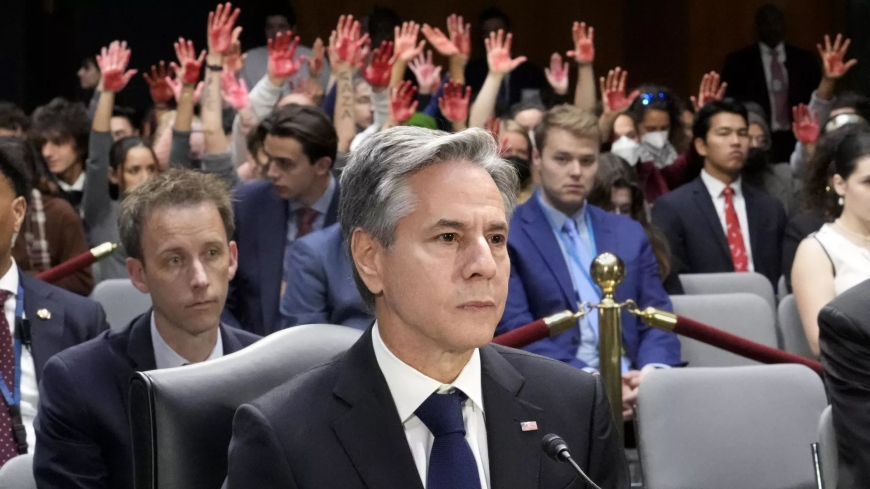Antony Blinken: A Legacy Marked by Controversial Foreign Policy Decisions
Antony Blinken, the United States Secretary of State, recently concluded his term amidst widespread criticism of his foreign policy record. While defending his tenure in various media interviews, Blinken leaves behind a legacy defined by contentious decisions that reshaped global geopolitics, including the Ukraine war, the Gaza conflict, and escalating tensions with major global powers like China, Russia, and Iran.

Antony Blinken, the Secretary of State of the United States, recently concluded his term amid widespread criticism of his foreign policy record. A legacy defined by contentious decisions that reshaped global geopolitics, including the Ukraine war, the Gaza conflict, and escalating tensions with major global powers like China, Russia, and Iran, is left behind by Blinken, who defended his tenure in various media interviews.
The Ukraine Conflict: A Missed Opportunity for Peace The United States adopted an assertive posture in the Ukraine conflict under Blinken's leadership. It is reported that in late 2022, Blinken opposed a proposal from General Mark Milley, the then-Chairman of the Joint Chiefs of Staff, to initiate peace negotiations between Ukraine and Russia. As an alternative, he promoted the expansion of military assistance to Kyiv, which resulted in the conflict becoming a protracted proxy war.
The conflict's origins can be traced back to the United States' unwavering support for NATO expansion, which included the possibility of Ukraine's membership—an issue that Russia had consistently identified as a red line. In late 2021, as tensions in the Donbass region escalated, Blinken's assurance of NATO's commitment to Ukraine signaled Washington's firm alignment with Kyiv. The United States provided Ukraine with billions of dollars in military aid, sophisticated armaments, and intelligence support in the aftermath of the outbreak of hostilities.
In early 2022, negotiations between Russia and Ukraine in Istanbul provided a glimmer of optimism; however, reports indicate that Western influence may have contributed to the failure of a potential peace agreement. NATO's interference was subsequently criticized by Russian President Vladimir Putin, who claimed that it sabotaged opportunities for resolution. The Gaza Crisis: Unwavering Support for Israel One of the most lethal military responses in Gaza's history was initiated by a surprise attack by Hamas in October 2023. Blinken stood beside Israeli Prime Minister Benjamin Netanyahu within days, committing the United States to provide unconditional support.
The United States provided Israel with tens of thousands of explosives and other munitions over the course of the subsequent year, which fueled an air campaign that severely damaged Gaza's infrastructure. In the densely populated Gaza Strip, over 70,000 tons of explosives were dropped, resulting in disastrous human tolls, as reported by rights monitors. This amount of explosives exceeded the amount used in key World War II bombardment campaigns. Critics contend that Blinken failed to capitalize on the opportunity to utilize U.S. influence to negotiate a cessation, thereby exacerbating civilian suffering and prolonging the conflict. A Record of Escalation: Global Tensions Additionally, during Blinken's tenure, tensions with Iran, North Korea, and China were elevated.
In order to mitigate China's influence, the United States enhanced its military alliances in the Asia-Pacific region, such as the AUKUS security treaty, and fortified its relationships with Japan and South Korea. The United States implemented comparable strategies in the Middle East, where it provided support to Israel in its conflicts with Iran and facilitated military operations in Yemen and Syria. Blinken's State Department navigated crises in Ethiopia, Libya, Sudan, and the Sahel in Africa, frequently facing criticism for its perceived interventionist policies.
The approach of his administration to Latin America and Eastern Europe was characterized by the provision of covert support for regime change initiatives in countries such as Nicaragua, Georgia, and Serbia. A Legacy of Polarization Blinken's foreign policy record is indicative of the persistence of U.S. interventionist traditions. Critics argue that his uncompromising perspective is demonstrated by his support for previous conflicts, including the 2003 invasion of Iraq and the 2011 intervention in Libya.
Although some regard him as a resolute advocate for U.S. interests, others contend that his strategies have resulted in the destabilization of regions and the straining of international relations. Blinken's controversial tenure will likely serve as a case study in the complexities of modern American diplomacy and its far-reaching consequences as the Biden administration prepares for new leadership at the State Department.













































